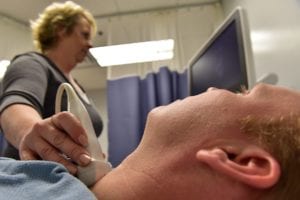Predicting Thyroid Disease After Immunotherapy for Mesothelioma
 Researchers in Italy say it is possible to predict which mesothelioma patients are likely to develop thyroid disease after immunotherapy. They are advising their colleagues to use the technique for better management of malignant mesothelioma.
Researchers in Italy say it is possible to predict which mesothelioma patients are likely to develop thyroid disease after immunotherapy. They are advising their colleagues to use the technique for better management of malignant mesothelioma.
Immune checkpoint inhibitors like Keytruda are improving the outlook for people with asbestos cancer. But immunotherapy is not without risk.
Certain people are prone to develop thyroid disease after immunotherapy. If doctors know ahead of time which mesothelioma patients are at risk, they can be better prepared to manage problems later.
Immune Checkpoint Inhibitors and Thyroid Disease after Immunotherapy
Pleural mesothelioma is extremely difficult to treat. Immune checkpoint inhibitors have given many mesothelioma patients new hope. Recent studies suggest that some of these drugs can improve mesothelioma survival.
Keytruda (pembrolizumab), Opdivo (nivolumab), and Bevencio (avelumab) are examples of immune checkpoint inhibitors. These drugs work by blocking proteins that let mesothelioma cells hide from the immune system.
Immune checkpoint inhibitors are reasonably safe. But they can still wreak havoc with the endocrine system. Thyroid disease after immunotherapy is the most common complication of immunotherapy.
Tools for Predicting Thyroid Problems
The new study was conducted at Ospedale Policlinico San Martino in Genoa. Twenty-eight patients with lung cancer or pleural mesothelioma received an immune checkpoint inhibitor. Some patients got ipilimumab and some received nivolumab.
Before they started immunotherapy, the patients had endocrine evaluations including blood tests and thyroid ultrasounds. Blood hormone tests were given every two weeks throughout immunotherapy treatment.
After three courses of therapy, patients had another follow-up.
Who Gets Thyroid Disease After Immunotherapy?
Of the 28 mesothelioma patients tested, half had a “previously unknown thyroid alteration” at their baseline exam. A quarter of patients had overt thyroid disease after immunotherapy.
Patients with unusual ultrasounds and bigger thyroids had a higher risk of thyroid disease after immunotherapy. When researchers combined these measurements with a thyroid enzyme test, they came up with a clinical score that was “highly predictive of the development of disease.”
“We obtained encouraging data regarding the possibility of predicting a thyroid disease and undertaking personalized follow-up,” writes lead study author Stefano Gay. “It is advisable to carry out a complete endocrinological assessment before starting immunotherapy, in order to improve patient management.”
Source:
Gay, S, et al, “Can baseline endocrinological examination and thyroid ultrasound predict the development of thyroid disease in immunotherapy-treated patients? Results from a prospective, single-center, open-label study”, March 6, 2019, Endocrine, Epub ahead of print, https://link.springer.com/article/10.1007%2Fs12020-019-01854-8





